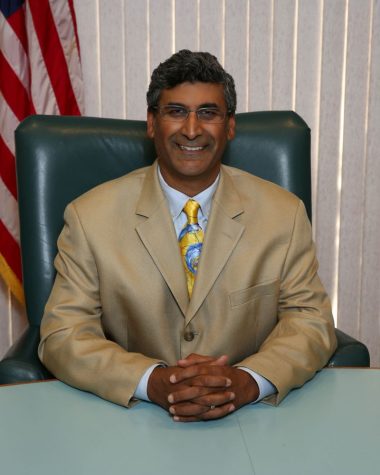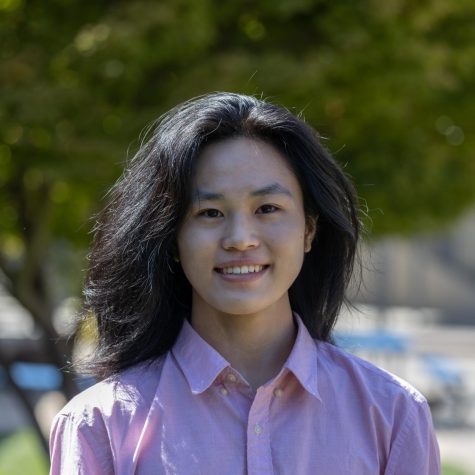OPINION: Sanjay Dave’s comment about AP classes is problematic
March 23, 2020
In an interview with the “Los Altos Town Crier,” MVLA School Board president Sanjay Dave expressed a desire to change the end of the school year calendar to align with the AP tests in May.
“Additional schooling after [AP tests], it’s kind of pointless,” Dave said to the Crier. “I’d rather have those days at the beginning of the calendar year, rather than at the end.”

It is appalling that the MVLA School Board president would say such a thing. Dave’s comment undermines the importance of deep learning, as it implies that the sole purpose of AP classes is to prepare for the test at the end. But what’s more concerning is that Dave doesn’t really know what is going on in the AP classrooms of his district.
While Dave’s proposal will not be implemented next year, he maintained that he will continue to advocate for a shift in the calendar in the upcoming years.
Regardless of whether or not he’s successful, Dave’s plan is problematic because any class—AP or not—is about learning. While AP classes should have some teaching to the test (in balanced moderation), passing the test certainly shouldn’t be the only goal of the class.
That’s why Dave’s statement is just plain false: Class time after AP exams is not “pointless.” The time after the AP test is a valuable opportunity to explore relevant concepts outside of College Board’s curriculum, then evaluate them in new, engaging ways.
In a follow-up interview with The Talon, Dave was asked about whether deep learning or teaching to the test should be prioritized. He repeatedly gave roundabout answers, claiming that he cared about both. But when it came down to it, his priority was clear:
“I think teachers should teach material that gives students the best opportunities to score on the exam,” Dave said. “I think that’s the goal for many AP students and why they signed up for the AP course in the first place.”
It’s true that many students have AP tests in mind when they sign up for their classes; however, saying this is the top priority and building a schedule around it simply reinforces and legitimizes an insidious, test-focused culture. In the already achievement-based bubble of Silicon Valley, this is especially detrimental.
With the negative impacts of Dave’s proposal come some potential positives—extra class time to slow down their class’s pace or delve deeper into certain topics, for example. Whether these benefits outweigh the harms, though, is something that each AP teacher has an opinion on.
The problem is, though, that Dave wouldn’t know about any of these opinions because there’s another significant issue: He is completely unaware of and unqualified to speak on what occurs in his district’s classrooms.
When asked about what goes on in AP classrooms after the test, Dave didn’t know. When asked about whether AP tests actually evaluate the depth of students’ understanding of content, Dave deferred to The College Board. And when asked how much time teachers generally want or need to cover content after the AP exam, Dave—yet again—didn’t know.
It’s not fair to expect Dave to know the curriculum for each and every AP class or how they function after the test. But as MVLA School Board president, Dave ought to have some idea. And before making a statement to the press, he should certainly know what he’s talking about.
In retrospect, Dave says that his phrasing wasn’t an entirely fair representation of reality, but ultimately still stands by his ideas.
“’Pointless’ was probably a strong word,” he said. “Maybe information afterward can be very valuable. But is it required for the course? No, it’s not.”
Dave’s response is inadequate. The MVLA community deserves better than that.
It’s not the first time Dave has tried to hide behind the excuse of poor phrasing either. In 2018, Dave insinuated that minority students are not “our most serious students” and are less capable of being successful in AP classes. In his apology, he said, “I definitely misspoke on what I said there.” This supposed poor phrasing has become a pattern, and he should know better by now.
We need to hold Dave accountable—he is responsible for knowing what’s going on in classrooms and what students actually need. The only way for Dave to fulfill that responsibility is to reach out to students and teachers to gain a broader, more informed perspective about AP classes. And if he can’t do that? Then he doesn’t deserve to be our school board president.





Anonny Moose | Apr 4, 2020 at 9:03 am
LMAO this article is so funny!!! i love it when talon posts comedy articles like this ???
Shay Adams | Apr 3, 2020 at 11:33 pm
That’s a major CAP, good sir.